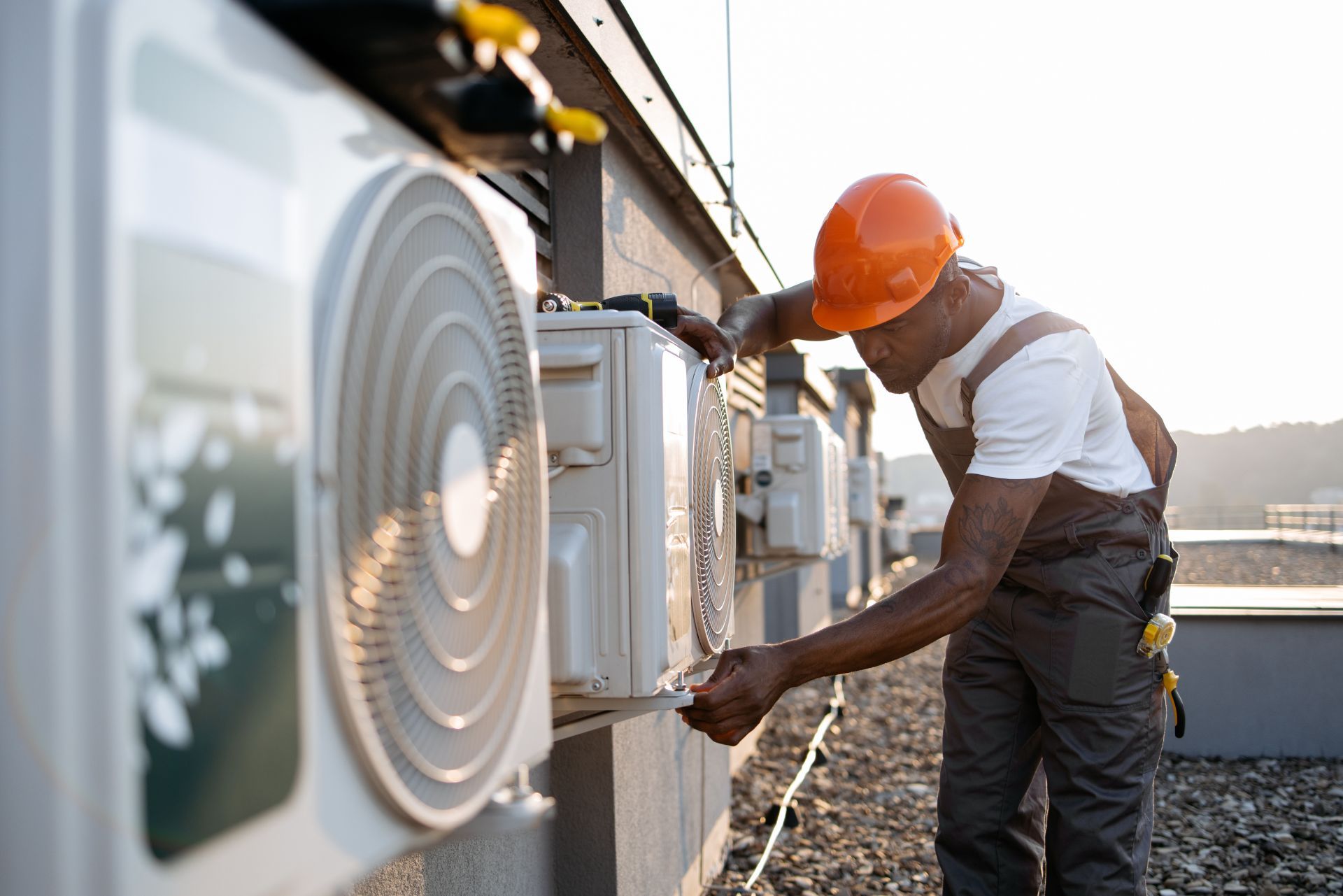Top 3 Recommended Policies

Indiana’s HVAC contractors handle everything from sweltering summer heat to freezing winter cold, and the work can be demanding year-round. Between job site hazards, expensive equipment, and growing liability risks, one unexpected incident can disrupt your business in an instant. Having the right insurance in place is what keeps those challenges from turning into major financial setbacks. This guide explains how HVAC contractor insurance in Indiana works, what types of coverage are most important, and how rising costs across the property and insurance markets are affecting contractors statewide. By understanding your options, you can protect your business, your employees, and your reputation no matter what the season brings.
Why HVAC Contractor Insurance Is Essential in Indiana
HVAC work involves a variety of risks—from handling heavy equipment to working with electrical systems and refrigerants. Without proper insurance, contractors expose themselves to potentially devastating financial losses. Insurance not only covers damages and injuries but also helps contractors comply with state regulations and build trust with clients.
According to TechInsurance, HVAC contractor insurance is indispensable because it protects against common risks such as contractor injuries, equipment theft, and liability claims. This coverage ensures that unexpected incidents don’t derail a business’s operations or financial health.
Moreover, Indiana’s climate and infrastructure challenges mean HVAC systems often require urgent repairs or replacements. With many homeowners unprepared for emergency expenses—65% have less than $1,000 saved for home repairs, and 57% find bills over $1,000 difficult to pay—contractors who are insured can provide reliable service without risking their own financial security. This dynamic makes insurance a foundational element of a sustainable HVAC business in Indiana.
In addition to protecting against financial loss, HVAC contractor insurance can also enhance a contractor's reputation in the community. Clients are more likely to choose a contractor who is insured, as it demonstrates professionalism and a commitment to quality work. This can lead to more referrals and repeat business, which are crucial for growth in a competitive market. Furthermore, many commercial clients require proof of insurance before hiring a contractor, making it not just a safety net but a necessary tool for accessing larger contracts and projects.
Additionally, the diverse range of services that HVAC contractors provide—from installation to maintenance—means that the potential for accidents and claims is ever-present. For instance, a contractor working on a rooftop unit may face risks associated with falls or equipment malfunctions. By having comprehensive insurance coverage, contractors can ensure they are prepared for any situation, allowing them to focus on delivering high-quality service rather than worrying about the financial implications of unforeseen events. This peace of mind ultimately contributes to a more efficient and effective operation, benefiting both the contractor and their clients.

Types of Insurance Coverage HVAC Contractors Need
HVAC contractors typically require several types of insurance to cover the full spectrum of risks they face. The most common policies include:
- General Liability Insurance: Covers third-party bodily injury, property damage, and legal defense costs if a contractor is sued.
- Workers' Compensation Insurance: Mandatory in Indiana for most businesses with employees, this covers medical expenses and lost wages if a worker is injured on the job.
- Commercial Property Insurance: Protects tools, equipment, and physical assets from damage or theft.
- Commercial Auto Insurance: Necessary if vehicles are used for business operations.
- Professional Liability Insurance: Also known as errors and omissions insurance, it covers claims related to mistakes or negligence in service delivery.
For Indiana HVAC contractors, workers’ compensation insurance is a significant cost factor. Industry data shows that the typical workers' compensation insurance cost per HVAC employee in Indiana is $1,638 annually. This figure reflects the inherent risks of the trade and the importance of protecting employees and employers alike. Contractor Nerd provides detailed insights into these costs and how they impact overall insurance budgeting.
In addition to the aforementioned policies, HVAC contractors may also consider obtaining Equipment Breakdown Insurance. This specialized coverage is crucial for protecting against the costs associated with the failure of essential equipment such as boilers, chillers, and air conditioning units. Given the high cost of HVAC machinery, this insurance can save contractors from substantial financial losses due to unexpected breakdowns that could halt operations and lead to lost revenue. Furthermore, Cyber Liability Insurance is becoming increasingly relevant as HVAC businesses adopt new technologies and digital systems for managing client data and operations. This policy helps protect against data breaches and cyberattacks, ensuring that sensitive customer information remains secure.
Moreover, HVAC contractors should also be aware of the importance of Umbrella Insurance. This policy provides an extra layer of liability coverage beyond the limits of their existing insurance policies. In the event of a major claim, such as a serious injury or property damage that exceeds the limits of their
general liability insurance,
umbrella insurance can help cover the additional costs, thereby safeguarding the contractor's financial stability. As the HVAC industry continues to evolve with new technologies and increasing regulatory requirements, having a comprehensive insurance portfolio is not just a safeguard but a strategic necessity for long-term success.
Understanding Insurance Premiums and Costs
The cost of HVAC contractor insurance varies based on multiple factors, including the size of the business, number of employees, coverage limits, and claims history. On average, insurance premiums for HVAC contractors range from 1.3% to 2.6% of annual revenue. This range allows contractors to estimate their insurance expenses relative to their business income and plan accordingly.
For example, a contractor generating $500,000 in revenue might expect to pay between $6,500 and $13,000 annually for insurance premiums. These costs, while significant, are an essential investment to mitigate potentially far higher expenses from accidents, lawsuits, or equipment loss.
Investing in comprehensive insurance coverage also enhances a contractor’s credibility with clients and suppliers, often making the difference in winning contracts. It signals professionalism and financial responsibility, which are highly valued in the competitive Indiana HVAC market.
Moreover, the type of coverage selected can greatly influence the overall cost of premiums. HVAC contractors may choose from various policies, such as general liability, workers' compensation, and commercial auto insurance, each tailored to address specific risks associated with their operations. For instance, general liability insurance protects against third-party claims for bodily injury or property damage, while workers' compensation is crucial for covering medical expenses and lost wages for employees injured on the job. Understanding these distinctions can help contractors make informed decisions about the level of coverage they require, ensuring they are adequately protected without overextending their budget.
Additionally, many insurance providers offer discounts for contractors who implement safety training programs or maintain a clean claims history. By investing in safety protocols and demonstrating a commitment to risk management, HVAC contractors can not only reduce their premiums but also foster a safer work environment for their employees. This proactive approach not only protects the business financially but also contributes to a positive workplace culture, which can enhance employee retention and satisfaction in the long run.
Risks and Common Claims in HVAC Work
HVAC contractors face several specific risks that insurance policies must address. One major concern is equipment failure or damage, which can lead to costly repairs or replacements. For instance, a cracked heat exchanger is not only expensive to fix but can also pose serious health risks due to potential carbon monoxide leaks. Roger Elkins, Director of HVAC Services for Williams Comfort Air, emphasizes the severity of such issues: "A cracked heat exchanger can be very costly, and it can also cause carbon monoxide to leak into the home." Proper insurance ensures that contractors can handle these situations without jeopardizing their business.
Another frequent problem is damage caused by sump pump or sump pump switch failures, which can lead to basement flooding. Paul Hallam, Director of Plumbing for Mr. Plumber, warns that "Not protecting your basement from flooding is just like gambling in a high-stakes poker game." These types of failures often result in emergency calls and urgent repairs, highlighting the need for contractors to have insurance coverage that includes emergency response and liability protection.
Given that many Indiana homeowners lack preventive HVAC and plumbing maintenance plans—69% according to a 2023 survey—contractors often face unpredictable service demands. This unpredictability further underscores the importance of insurance to cover unforeseen incidents and protect the contractor’s bottom line. HVACR Business provides valuable insights into these homeowner preparedness trends and their implications for contractors.
Additionally, HVAC contractors must navigate the complexities of workplace safety, as they often work in hazardous environments. The risks of slips, trips, and falls are heightened when working on rooftops or in cramped spaces, making it essential for contractors to have comprehensive liability insurance. The Occupational Safety and Health Administration (OSHA) emphasizes the need for safety training and protective equipment, yet accidents can still occur. This reality not only affects the health of the workers but can also lead to costly claims against the contractor's insurance, further illustrating the need for robust coverage.
Moreover, the evolving technology in HVAC systems introduces another layer of risk. With the rise of smart HVAC systems, contractors must stay informed about the latest advancements and potential cybersecurity threats. A breach in a smart system could lead to unauthorized access and manipulation, resulting in significant liability issues. As highlighted by industry experts, contractors must not only be skilled in traditional HVAC work but also be prepared to handle the complexities of modern technology, making specialized insurance coverage increasingly vital to protect against these emerging risks.

How to Choose the Right Insurance for Your HVAC Business
Selecting the appropriate insurance coverage requires careful evaluation of your business’s specific needs and risks. Start by assessing the size of your operation, the number of employees, types of services offered, and the equipment you use. Consulting with an insurance agent who specializes in construction or HVAC coverage can help tailor a policy that fits your circumstances.
It’s also important to compare quotes from multiple insurers to find competitive rates without sacrificing coverage quality. Remember that the cheapest policy may not provide adequate protection, potentially leaving you exposed to significant liabilities.
Additionally, review your insurance annually to adjust coverage as your business grows or changes. Staying proactive with insurance management ensures continuous protection and compliance with Indiana state requirements.
When evaluating insurance options, consider the various types of coverage available, such as general liability, professional liability, and workers' compensation. General liability insurance protects against third-party claims for bodily injury or property damage, which is crucial for HVAC businesses that frequently work on clients' properties. Professional liability insurance, on the other hand, covers claims related to negligence or errors in the services provided, safeguarding your business from potential lawsuits. Workers' compensation is essential for protecting your employees in case of workplace injuries, ensuring they receive necessary medical care while also shielding your business from related legal claims.
Moreover, don't overlook the importance of business interruption insurance. This coverage can be a lifesaver if your operations are halted due to unforeseen events, such as natural disasters or equipment failures. It helps cover lost income and ongoing expenses, allowing you to maintain financial stability during challenging times. As your HVAC business expands, consider additional coverages like commercial auto insurance for your service vehicles and equipment insurance for protecting costly tools and machinery. By understanding and selecting the right mix of insurance policies, you can build a robust safety net that supports your business's long-term success.
Conclusion: Protecting Your Indiana HVAC Business with Insurance
In the dynamic and sometimes unpredictable HVAC industry, insurance is not just an option—it’s a necessity. Indiana contractors face unique challenges, from rising homeowner insurance premiums to the risks of costly equipment failures and workplace injuries. Having the right insurance coverage safeguards your business against these threats, providing financial security and peace of mind.
By understanding the types of coverage available, the typical costs involved, and the specific risks you face, you can make informed decisions that protect your livelihood. As the HVAC market continues to evolve, staying insured and prepared will keep your business resilient and ready to meet the demands of Indiana homeowners.
For more detailed information on HVAC contractor insurance and related costs, resources like Contractor Nerd offer valuable guidance tailored to contractors in Indiana and beyond.
Contact Us
HVACInsure is fully licensed and permitted to sell contractor and commercial insurance in Indiana.
We proudly serve clients throughout Indiana and maintain partnerships with local Indiana insurance carriers to ensure HVAC professionals receive compliant, affordable, and comprehensive coverage that meets project and regulatory requirements.
HVACInsure Focuses on Illinois HVAC Contractor Insurance
Indianapolis – Fort Wayne – Evansville – South Bend – Carmel – Fishers – Bloomington – Hammond – Gary – Lafayette – Muncie – Noblesville – Terre Haute – Greenwood – Kokomo – Anderson – Elkhart – Mishawaka – Lawrence – Jeffersonville – Columbus – Westfield – New Albany – Richmond – Portage
Frequently Asked Question
Common HVAC Contractor Insurance Questions in Indiana
These FAQs address common contractor questions. As HVACInsure grows, we will update this section with real client experiences and answers.
How does Indiana's manufacturing economy affect my HVAC insurance?
Indiana has significant industrial facilities. We cover plant maintenance work, process cooling, and the specialized requirements of industrial HVAC.
What coverage do I need for Indiana's weather extremes?
Indiana sees cold winters and humid summers. We structure coverage for year-round demand and the strain seasonal transitions put on systems.
Do I need special coverage for working at automotive plants?
Indiana's auto industry requires specialized contractor coverage. We understand OEM facility requirements and can meet their certificate demands.
What about coverage for Indianapolis commercial work?
Indy is a growing commercial market. We cover the liability exposure and certificate requirements of downtown and suburban commercial projects.
How do Indiana's licensing requirements affect my insurance?
Indiana requires HVAC contractors to be licensed. We ensure your coverage meets state requirements and provide necessary certificates.
Can I get coverage for agricultural HVAC applications?
Absolutely. Indiana's farms need climate control. We cover barn ventilation, grain drying, livestock cooling, and other agricultural HVAC work.

Still have questions?
Can’t find the answer you’re looking for? Please chat to our friendly team!

About The Author: James Jenkins
I’m James Jenkins, Founder and CEO of HVACInsure. I work with HVAC contractors and related trades to simplify insurance and make coverage easier to understand. Every day, I help business owners secure reliable protection, issue certificates quickly, and stay compliant so their teams can keep working safely and confidently.
Recognized by National HVAC Trade Associations
These trusted organizations set best practices and standards that carriers rely on when underwriting HVAC risks.
Membership signifies adherence to HVAC industry standards and contractor best practices.


